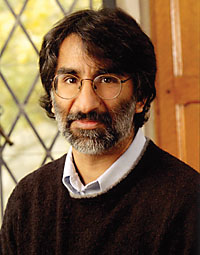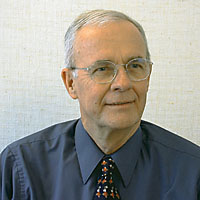 | Akhil Reed Amar |
A Yale Law School professor whose course in “Constitutional Law” has inspired hundreds of undergraduates
and a retired chemistry professor who directed 60 Ph.D. dissertations and brought
life to the teaching of general and physical chemistry were honored with this
year’s William Clyde DeVane Award for Distinguished Scholarship and Teaching.
T H I S
Amar and Crothers cited for
teaching and scholarship
Akhil Reed Amar, the Southmayd Professor of Law and Political Science, and Donald
Crothers, Sterling Professor Emeritus of Chemistry and professor emeritus of
molecular biophysics and biochemistry, were presented with DeVane Awards at the
annual banquet of the Yale Chapter of Phi Beta Kappa on Feb. 25.
Conferred since 1966, the DeVane Award (formerly known as the DeVane Medal) is
a prestigious tribute to excellence in scholarship and teaching. It is the oldest
and highest-ranking award for undergraduate teaching at Yale. The award is named
for William Clyde DeVane, who was dean of Yale College 1938-1963 and served as
president both of the Yale and United Chapters of Phi Beta Kappa. DeVane was
also a member of the Phi Beta Kappa Senate.
Graduate members of Phi Beta Kappa select a retired faculty member for one of
the awards, and Yale College seniors who are members of the society choose an
honoree from among active faculty members who have been teaching at Yale for
at least five years. Crothers was chosen by the alumni and Amar by the undergraduates.
One tradition of the Phi Beta Kappa banquet is to have a Yale poet present an
original, unpublished poem. This year Dolores Hayden, professor of architecture
and American studies, read “Time Is Looking In To Space,” a poem
about doing research in the British Museum. Anthony Kronman, Sterling Professor
of Law and former dean of the Yale Law School, was the keynote speaker at the
dinner. He was introduced by Joshua Sweren ’08, undergraduate president
of the Yale chapter of Phi Beta Kappa.
Akhil Reed Amar
Jessica Bialecki ’08, treasurer of the chapter, introduced Amar by reading
excerpts from last semester’s online course evaluations of his teaching.
One student urged, “For God’s sake and for America’s sake,
take this class. It changed my life. For people who might want to be lawyers,
for Americans, for anyone who thinks. Take it.” Another wrote, “Akhil
Amar is the most brilliant lecturer I have ever heard. I originally shopped the
class just to hear one lecture, not intending to enroll. During that first lecture,
his eloquence actually moved me to tears, and I immediately signed up.” And
a third wrote, “Akhil Amar is among the most intelligent and inspiring
people in the world (no exaggeration) and makes a concerted effort to get to
know his undergraduate students on a personal level.”
Bialecki concluded by praising Amar in her own words. “Professor Amar has
risen to celebrity status among undergrads here at Yale, and for good reason.
His brilliance and mastery of constitutional law alone are staggering, but what
really makes Professor Amar stand out from the crowd of outstanding professors
here at Yale is his genuine commitment to undergraduate education. … His
enthusiasm is palpable each time he takes the stage of the Law School lecture
hall, and his passion is contagious, even continuing over to the weekly lunches
he holds in the Law School cafeteria with interested students.
“When I look back on my Yale College career years down the road from now,” she
continued, “I’m not certain I’ll remember the names and dates
of the many, many, many Supreme Court cases we covered in class, but I know that
I will never forget the inspiring teaching of Professor Akhil Amar.”
Amar teaches and writes about constitutional law in both Yale College and Yale
Law School. He received his B.A, summa cum laude, in 1980 from Yale College,
and his J.D. in 1984 from Yale Law School, where he served as an editor of The
Yale Law Journal. After clerking for Judge Stephen Breyer, U.S. Court of Appeals,
1st Circuit, Amar joined the Yale faculty in 1985. He is a co-editor of a leading
constitutional law casebook, “Processes of Constitutional Decisionmaking,” and
the author of several books, including “The Constitution and Criminal Procedure:
First Principles,” “The Bill of Rights: Creation and Reconstruction” and,
most recently, “America’s Constitution: A Biography.”

Donald Crothers
Donald Crothers
Assistant Professor Anne Valentine, graduate vice president of the chapter, and
William Segraves, a member of the Executive Committee of Graduate Advisers, jointly
introduced Crothers.
Valentine said, “I have personal testimony of the importance of teaching
to Don. When I was being recruited to Yale, the senior faculty in my department
told me that, as a department, they strive for good teaching, and divide teaching
responsibilities evenly among the faculty from the greatest to the lowliest,
and that that ethic was instilled by Don Crothers when he was chair.”
Segraves cited Crother’s Yale Classbook of 50 years ago, in which he had
written, “If Yale is to draw the best minds of the future, she must not
let her position in science slip, for that is the area towards which more and
more of the minds of genius class will be pointing in the future. To leave science
out of Yale would leave the University in the backwash of modern civilization,
a relic of the century in which it was founded.”
Valentine concluded by saying, “On this night when we honor excellence
in all fields of knowledge … we also honor you, Don Crothers, for your
scientific accomplishment and for your devoted teaching, and with proud hearts
offer you a big Bulldog Bow Wow.”
Crothers graduated summa cum laude from Yale with a B.S. in 1958 and earned a
B.A. from the University of Cambridge two years later. He went on to earn a Ph.D.
from University of California-San Diego in 1963 and to hold a postdoctoral fellowship
at the Max Planck Institute in Germany before joining the Yale faculty in 1964.
In addition to his outstanding teaching, he headed a lab doing research in biophysical
chemistry, specifically studying how the structure, dynamics and protein-binding
properties of nucleic acids contribute to their function. An outstanding research
scientist, he won the Alexander von Humbolt Senior Scientist Award, was named
a fellow of the National Academy of Arts and Sciences and elected to the National
Academy of Sciences. Crothers and David S. Eisenberg of the University of California-Los
Angeles, co-authors of the widely used textbook “Physical Chemistry with
Applications to the Life Sciences,” recently received the Emily M. Gray
Award of the Biophysical Society for “significant contributions to education
through creating rigorous, groundbreaking texts enriching generations of biophysicists.”
Phi Beta Kappa, the nation’s oldest undergraduate honors organization,
was founded in 1776 at the College of William and Mary in Williamsburg, Virginia.
Four years later, the original Phi Beta Kappa Society was abruptly forced to
cease operations as the British army under Cornwalis advanced on the city. The
year before, however, the society had already granted charters to Yale and Harvard,
making them the second and third chapters of the organization, respectively.
Last year, the Yale Chapter of Phi Beta Kappa presented DeVane Awards to Marvin
Chun, a professor of psychology, and John Hollander, the Sterling Professor Emeritus
of English. Previous winners of the award have included economist Benjamin Polak;
art historian Jules D. Prown; historians Edmund S. Morgan, Howard R. Lamar, Jonathan
Spence and John Gaddis; literary scholars Cleanth Brooks, Maynard Mack and Marie
Borroff; political scientist Robert A. Dahl; economist James Tobin; and sociologist
Kai Erickson.
 W E E K ' S
W E E K ' S S T O R I E S
S T O R I E S![]()
 Yale study offers revolutionary view of ecosystem ecology
Yale study offers revolutionary view of ecosystem ecology![]()
![]()
 USA Today honors students for their work ‘beyond the classroom’
USA Today honors students for their work ‘beyond the classroom’![]()
![]()
 Amar and Crothers cited for teaching and scholarship
Amar and Crothers cited for teaching and scholarship![]()
![]()
 Yale expert on elections helped to monitor ‘historic’ vote in
Pakistan
Yale expert on elections helped to monitor ‘historic’ vote in
Pakistan![]()
![]()
 Yale-developed artificial cell helps immune system fight cancer
Yale-developed artificial cell helps immune system fight cancer![]()
![]()
 Divinity School professor to head Union Theological Seminary
Divinity School professor to head Union Theological Seminary![]()
![]()
 Lavik lauded for innovation, leadership
Lavik lauded for innovation, leadership![]()
![]()
 Liman Colloquium to examine public interest advocacy . . .
Liman Colloquium to examine public interest advocacy . . .![]()
![]()
 Library staff wins Noah Webster Award for . . .
Library staff wins Noah Webster Award for . . .![]()
![]()
 Campus Notes
Campus Notes![]()
Bulletin Home |
| Visiting on Campus
Visiting on Campus |
| Calendar of Events
Calendar of Events |
| In the News
In the News![]()
Bulletin Board |
| Classified Ads
Classified Ads |
| Search Archives
Search Archives |
| Deadlines
Deadlines![]()
Bulletin Staff |
| Public Affairs
Public Affairs |
| News Releases
News Releases |
| E-Mail Us
E-Mail Us |
| Yale Home
Yale Home